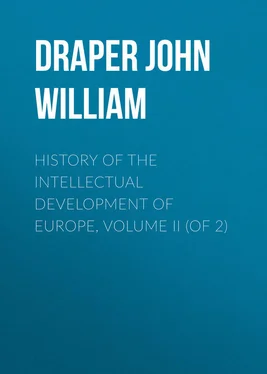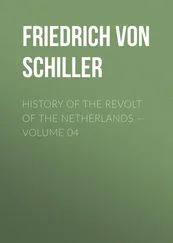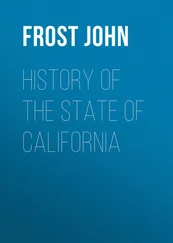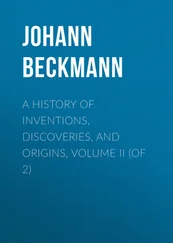John Draper - History of the Intellectual Development of Europe, Volume II (of 2)
Здесь есть возможность читать онлайн «John Draper - History of the Intellectual Development of Europe, Volume II (of 2)» — ознакомительный отрывок электронной книги совершенно бесплатно, а после прочтения отрывка купить полную версию. В некоторых случаях можно слушать аудио, скачать через торрент в формате fb2 и присутствует краткое содержание. Жанр: foreign_antique, foreign_prose, на английском языке. Описание произведения, (предисловие) а так же отзывы посетителей доступны на портале библиотеки ЛибКат.
- Название:History of the Intellectual Development of Europe, Volume II (of 2)
- Автор:
- Жанр:
- Год:неизвестен
- ISBN:нет данных
- Рейтинг книги:4 / 5. Голосов: 1
-
Избранное:Добавить в избранное
- Отзывы:
-
Ваша оценка:
- 80
- 1
- 2
- 3
- 4
- 5
History of the Intellectual Development of Europe, Volume II (of 2): краткое содержание, описание и аннотация
Предлагаем к чтению аннотацию, описание, краткое содержание или предисловие (зависит от того, что написал сам автор книги «History of the Intellectual Development of Europe, Volume II (of 2)»). Если вы не нашли необходимую информацию о книге — напишите в комментариях, мы постараемся отыскать её.
History of the Intellectual Development of Europe, Volume II (of 2) — читать онлайн ознакомительный отрывок
Ниже представлен текст книги, разбитый по страницам. Система сохранения места последней прочитанной страницы, позволяет с удобством читать онлайн бесплатно книгу «History of the Intellectual Development of Europe, Volume II (of 2)», без необходимости каждый раз заново искать на чём Вы остановились. Поставьте закладку, и сможете в любой момент перейти на страницу, на которой закончили чтение.
Интервал:
Закладка:
Cultivation of grammar, rhetoric, composition.With a pride perhaps not altogether inexcusable, the Arabians boasted of their language as being the most perfect spoken by man. Mohammed himself, when challenged to produce a miracle in proof of the authenticity of his mission, uniformly pointed to the composition of the Koran, its unapproachable excellence vindicating its inspiration. The orthodox Moslems – the Moslems are those who are submissively resigned to the Divine will – are wont to assert that every page of that book is indeed a conspicuous miracle. It is not then surprising that, in the Arabian schools, great attention was paid to the study of language, and that so many celebrated grammarians were produced. By these scholars, dictionaries, similar to those now in use, were composed; their copiousness is indicated by the circumstance that one of them consisted of sixty volumes, the definition of each word being illustrated or sustained by quotations from Arab authors of acknowledged repute. They had also lexicons of Greek, Latin, Hebrew; and cyclopedias such as the Historical Dictionary of Sciences of Mohammed Ibn Abdallah, of Granada. In their highest civilization and luxury they did not forget the amusements of their forefathers – listening to the tale-teller, who never failed to obtain an audience in the midst of Arab tents. Around the evening fires in Spain the wandering literati exercised their wonderful powers of Oriental invention, edifying the eager listeners by such narrations as those that have descended to us in the Arabian Nights' Entertainments. The more sober and higher efforts of the educated were, of course, directed to pulpit eloquence, in conformity with the example of all the great Oriental khalifs, and sanctified by the practice of the Prophet himself. Defects of their literature.Their poetical productions embraced all the modern minor forms – satires, odes, elegies, etc.; but they never produced any work in the higher walks of poesy, no epic, no tragedy. Perhaps this was due to their false fashion of valuing the mechanical execution of a work. They were the authors and introducers of rhyme; and such was the luxuriance and abundance of their language, that, in some of their longest poems, the same rhyme is said to have been used alternately from the beginning to the end. Where such mechanical triumphs were popularly prized, it may be supposed that the conception and spirit would be indifferent. Even among the Spanish women there were not a few who, like Velada, Ayesha, Labana, Algasania, achieved reputation in these compositions; and some of them were daughters of khalifs. And this is the more interesting to us, since it was from the Provençal poetry, the direct descendant of these efforts, that European literature arose. Sonnets and romances at last displaced the grimly-orthodox productions of the wearisome and ignorant fathers of the Church.
If fiction was prized among the Spanish Arabs, history was held in not less esteem. Every khalif had his own historian. The instincts of the race are perpetually peeping out; not only were there historians of the Commanders of the Faithful, but also of celebrated horses and illustrious camels. In connexion with history, statistics were cultivated; this having been, it may be said, a necessary study, from the first enforced on the Saracen officers in their assessment of tribute on conquered misbelievers, and subsequently continued as an object of taste. Their taste for practical science.It was, doubtless, a similar necessity, arising from their position, that stamped such a remarkably practical aspect on the science of the Arabs generally. Many of their learned men were travellers and voyagers, constantly moving about for the acquisition or diffusion of knowledge, their acquirements being a passport to them wherever they went, and a sufficient introduction to any of the African or Asiatic courts. They were thus continually brought in contact with men of affairs, soldiers of fortune, statesmen, and became imbued with much of their practical spirit; and hence the singularly romantic character which the biographies of many of these men display, wonderful turns of prosperity, violent deaths. The scope of their literary labours offers a subject well worthy of meditation; it contrasts with the contemporary ignorance of Europe. Some wrote on chronology; some on numismatics; some, now that military eloquence had become objectless, wrote on pulpit oratory; some on agriculture and its allied branches, as the art of irrigation. Not one of the purely mathematical, or mixed, or practical sciences was omitted. Their continued inclination to the study of medicine.Out of a list too long for detailed quotation, I may recall a few names. Assamh, who wrote on topography and statistics, a brave soldier, who was killed in the invasion of France, A.D. 720; Avicenna, the great physician and philosopher, who died A.D. 1037; Averroes, of Cordova, the chief commentator on Aristotle, A.D. 1198. It was his intention to unite the doctrines of Aristotle with those of the Koran. To him is imputed the discovery of spots upon the sun. The leading idea of his philosophy was the numerical unity of the souls of mankind, though parted among millions of living individuals. He died at Morocco. Abu Othman wrote on zoology; Alberuni, on gems – he had travelled to India to procure information; Rhazes, Al Abbas, and Al Beithar, on botany – the latter had been in all parts of the world for the purpose of obtaining specimens. Ebn Zoar, better known as Avenzoar, may be looked upon as the authority in Moorish pharmacy. Pharmacopœias were published by the schools, improvements on the old ones of the Nestorians: to them may be traced the introduction of many Arabic words, such as syrup, julep, elixir, still used among apothecaries. Relics of the Arab vocabulary.A competent scholar might furnish not only an interesting, but valuable book, founded on the remaining relics of the Arab vocabulary; for, in whatever direction we may look, we meet, in the various pursuits of peace and war, of letters and of science, Saracenic vestiges. Our dictionaries tell us that such is the origin of admiral, alchemy, alcohol, algebra, chemise, cotton, and hundreds of other words. The Saracens commenced the application of chemistry, both to the theory and practice of medicine, in the explanation of the functions of the human body and in the cure of its diseases. Their medicine and surgery.Nor was their surgery behind their medicine. Albucasis, of Cordova, shrinks not from the performance of the most formidable operations in his own and in the obstetrical art; the actual cautery and the knife are used without hesitation. He has left us ample descriptions of the surgical instruments then employed; and from him we learn that, in operations on females in which considerations of delicacy intervened, the services of properly instructed women were secured. How different was all this from the state of things in Europe; the Christian peasant, fever-stricken or overtaken by accident, hied to the nearest saint-shrine and expected a miracle; the Spanish Moor relied on the prescription or lancet of his physician, or the bandage and knife of his surgeon.
Liberality of the Asiatic khalifs.In mathematics the Arabians acknowledged their indebtedness to two sources, Greek and Indian, but they greatly improved upon both. The Asiatic khalifs had made exertions to procure translations of Euclid, Apollonius, Archimedes, and other Greek geometers. Almaimon, in a letter to the Emperor Theophilus, expressed his desire to visit Constantinople if his public duties would have permitted. He requests of him to allow Leo the mathematician to come to Bagdad to impart to him a portion of his learning, pledging his word that he would restore him quickly and safely again. "Do not," says the high-minded khalif, "let diversity of religion or of country cause you to refuse my request. Do what friendship would concede to a friend. In return, I offer you a hundred weight of gold, a perpetual alliance and peace." True to the instincts of his race and the traditions of his city, the Byzantine sourly and insolently refused the request, saying that "the learning which had illustrated the Roman name should never be imparted to a barbarian."
Читать дальшеИнтервал:
Закладка:
Похожие книги на «History of the Intellectual Development of Europe, Volume II (of 2)»
Представляем Вашему вниманию похожие книги на «History of the Intellectual Development of Europe, Volume II (of 2)» списком для выбора. Мы отобрали схожую по названию и смыслу литературу в надежде предоставить читателям больше вариантов отыскать новые, интересные, ещё непрочитанные произведения.
Обсуждение, отзывы о книге «History of the Intellectual Development of Europe, Volume II (of 2)» и просто собственные мнения читателей. Оставьте ваши комментарии, напишите, что Вы думаете о произведении, его смысле или главных героях. Укажите что конкретно понравилось, а что нет, и почему Вы так считаете.












